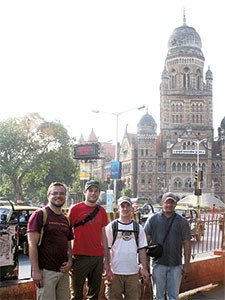U of M wins $4.5 million NSF grant to study low-carbon, sustainable cities

Contacts:
Julie Lund, Humphrey School of Public Affairs, julie@umn.edu, (612) 624-1190
Julie Christensen, University News Service, jrchris@umn.edu, (612) 626-1720 University News Service, unews@umn.edu, (612) 624-5551
Civil engineering assistant professor is part of the research team to help study connections between air pollution and health
MINNEAPOLIS / ST. PAUL (12/03/2012) —The University of Minnesota announced today that it has received a four-year, $4.5 million Partnerships for International Research and Education (PIRE) grant from the National Science Foundation (NSF) to design, compare and contrast the development of sustainable and healthy cities in the U.S. and Asia. The grant will explore the specific transformations needed to achieve low-carbon, resource-efficient and healthy city goals in the United States, China and India.
The University of Minnesota is the lead institution for the grant, which includes researchers from Yale University, Georgia Institute of Technology, the National Center for Atmospheric Research, the University of Colorado–Denver and the National Academy of Engineering. Professor Anu Ramaswami, the Charles M. Denny, Jr., Chair for Science, Technology and Public Policy at the University’s Humphrey School of Public Affairs, will serve as lead researcher on the project. College of Science and Engineering assistant professor of civil engineering Julian Marshall is also part of the research team.
The researchers will draw on expertise in engineering, environmental sciences, social sciences and public health to provide a road map for sustainable development for different types of cities worldwide. In addition to examining how best to reduce greenhouse gas emissions, researches will address economic development, water scarcity, environmental pollution, climate change and public health issues.
Commenting on the project, Dr. Ramaswami said, "Fossil fuel use by China, India and the United States is about half of the entire world’s energy use each year. We have to start there if we are to make meaningful change in reducing carbon emissions and improving health and sustainability."
The international research will focus on Asian cities in transition—rapidly industrializing cities with populations of less than one million that are expected to dominate future urbanization—and compare their development to that of megacities (populations of more than 10 million) and smaller service economy cities in the United States.
Eric Schwartz, Dean of the Humphrey School, also emphasized the importance of the project: "In light of the worldwide phenomena of rapid urbanization, the model that Anu and her colleagues are developing has the power to change the environmental future of the world."
In seeking to determine the changes needed to realize low-carbon, resource-efficient healthy cities in the United States, China and India, the U of M team will use tools and techniques from a broad array of disciplines:
Ramaswami and her students will study the flow of water, energy and materials in cities, connecting resource use with economic development, health and social well-being. She will also continue her research on developing sustainable electric power systems under extreme water-scarcity conditions, as found in many Asian cities.
- Humphrey School associate professor Elizabeth Wilson will examine the policy and politics of the rapidly growing Chinese electric power system.
- Humphrey School assistant professor Jason Cao will focus on the design of bus rapid transit in highly populated and congested Asian cities.
- Humphrey School professors Larry Jacobs and Joe Soss provide insights on the politics of poverty, urban infrastructure change and governance to better understand the socio-political factors that can enable or obstruct systemic changes in cities.
- College of Science and Engineering assistant professor of civil engineering Julian Marshall will examine the relationship between air pollution and health, and identify pathways to seed social and environmental entrepreneurship in India.
- Marshall and Ramaswami will undertake a community health study in India to identify the extent to which residents in urban slums are exposed to risk factors - air and water pollution, and climate extremes such as extreme heat, storms and urban flooding - and the infrastructure interventions that can mitigate these risks.
The grant will also support the research of about 12 master’s and PhD students at U of M. In addition, the University will offer an international summer school on "Sustainable Infrastructures, Sustainable Cities" for students from partner universities in the United States, China and India in 2013, 2014 and 2015.
Global research partners on the grant include Tongji University, Tsinghua University, the Chinese Academy of Sciences–Institute for the Urban Environment (CAS-IUE), the Indian Institute of Technology and TERI University, as well as several nongovernmental organizations–ICLEI-South Asia, the Urban Health Research Center and the Resource Optimization Initiative–India.
The collaborators in India were just awarded $340,000 to support field work and capacity building activities in India to be undertaken jointly with the U.S. team through a new Partnerships for Enhanced Engagement in Research (PEER) competitive grants program launched by the USAID with the US NSF and the National Academy of Sciences.
By winning the NSF PIRE award and its accompanying USAID PEER supplement, the University of Minnesota is poised to become a leader in implementing innovative multi-country, multi-institution, inter-disciplinary research and education partnerships that will benefit cities, communities and the environment, worldwide.
Humphrey School of Public Affairs
The Humphrey School ranks among the top professional schools of public affairs at public universities in the country. The School is widely recognized for its role in examining public issues and shaping policy and planning at the local, state, national, and international levels, as well as for providing leadership and management expertise to public and nonprofit organizations. The School offers five graduate degrees, including a Master of Development Practice degree in international development that welcomed its first cohort in August 2010.
